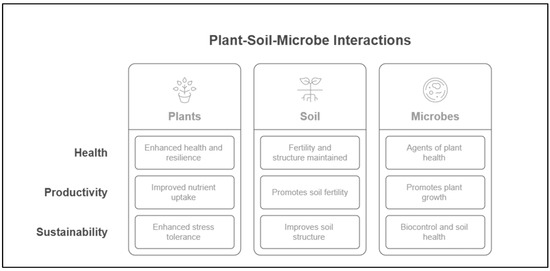The interactions between plants, soil, and microorganisms play a pivotal role in shaping ecosystem health, biodiversity, and agricultural productivity [1]. As our understanding of these complex interactions deepens, new opportunities emerge for improving agricultural sustainability, soil health, and plant resilience [2]. This Special Issue presents cutting-edge research that explores the dynamic roles of microorganisms in improving plant resilience, promoting soil health, and enhancing agricultural productivity.
Microbial communities residing in the rhizosphere and soil environment significantly influence plant growth, nutrient uptake, and stress tolerance [3,4]. Microorganisms, including mycorrhizal fungi, nitrogen-fixing bacteria, and plant-growth-promoting rhizobacteria (PGPR), are integral to enhancing soil fertility and plant productivity, as well as to protecting plants from environmental stresses and diseases [5,6]. As we reflect on the contributions of this Special Issue, it is evident that the exploration of plant–soil–microbe interactions holds tremendous potential for transforming agricultural practices, environmental sustainability, and ecosystem health. The collaborative efforts of scientists from various disciplines have significantly advanced our understanding of how soil microorganisms influence plant growth, stress tolerance, and disease resistance.
This Special Issue brings together diverse research that highlights the role of microbial communities in promoting soil fertility, improving plant resilience, and enhancing agricultural productivity (Figure 1). These contributions pave the way for innovative solutions to address the challenges posed by soil degradation, climate change, and the increasing demand for sustainable farming practices. The studies presented here not only offer insights into the current state of research, but also set the stage for the next generation of microbial-based strategies for improving crop health and soil management. With the growing recognition of the vital role microorganisms play in shaping plant–soil interactions, these studies collectively advance our understanding of how microbial diversity can be harnessed to foster more sustainable and resilient agricultural ecosystems. From biocontrol and plant growth promotion to microbial ecology and soil health, the research in this Special Issue underscores the promise of microbial solutions in addressing global agricultural challenges.

Figure 1.
Impact of plant–soil–microbe interactions on health, productivity, and sustainability (created on https://app.napkin.ai. (accessed on 8 April 2025)).
In conclusion, ‘Insights into Plant–Soil–Microbe Interactions’ provides a comprehensive overview of the dynamic interactions that govern plant health, soil fertility, and ecosystem sustainability. The research presented in this issue not only advances our understanding of plant–microbe relationships, but also lays the groundwork for innovative strategies to enhance agricultural productivity in an environmentally sustainable manner.
Data Availability Statement
Not applicable.
Conflicts of Interest
The author declares no conflicts of interest.
List of Contributions
The articles featured in this issue delve into various aspects of these plant–microbe interactions, from beneficial microbial symbioses that enhance nutrient uptake and stress tolerance to microbial strategies for combating plant diseases and improving soil structure. These contributions underscore the importance of microorganisms not only as agents of plant health, but also as vital players in maintaining the balance and fertility of soils. The findings presented here represent the forefront of research in agricultural microbiology, offering a wealth of knowledge that will shape the future of crop protection and soil management.
- Chen, S.; Cao, J.; Zhao, P.; Wang, Z.; Wang, X.; Liu, G.; Zhong, N. Deciphering the Effects of Phosphate Fertiliser on Rhizospheric Bacterial Community Structure and Potato Common Scab. Microorganisms 2024, 12, 2322.
- Eaton, W.D.; Hamilton, D.A. Increasing Ages of Inga punctata Tree Soils Facilitate Greater Fungal Community Abundance and Successional Development, and Efficiency of Microbial Organic Carbon Utilization. Microorganisms 2024, 12, 1996.
- Khan, I.; Mohyuddin, S.G.; Sohail; Zaman, S.; Qadir, M.; Guo, J.; Li, G. Enhancing Growth in Vigna radiata through the Inhibition of Charcoal Rot Disease: A Strategic Approach Using Plant Growth-Promoting Rhizobacteria. Microorganisms 2024, 12, 1852.
- Li, H.; Man, H.; Han, J.; Jia, X.; Wang, L.; Yang, H.; Shi, G. Soil Microorganism Interactions under Biological Fumigations Compared with Chemical Fumigation. Microorganisms 2024, 12, 2044.
- Meng, M.; Ren, B.; Yu, J.; Li, D.; Li, H.; Li, J.; Yang, J.; Bai, L.; Feng, Y. Cenchrus spinifex Invasion Alters Soil Nitrogen Dynamics and Competition. Microorganisms 2024, 12, 2120.
References
- Nizamani, M.M.; Hughes, A.C.; Qureshi, S.; Zhang, Q.; Tarafder, E.; Das, D.; Acharya, K.; Wang, Y.; Zhang, Z.-G. Microbial biodiversity and plant functional trait interactions in multifunctional ecosystems. Appl. Soil Ecol. 2024, 201, 105515. [Google Scholar] [CrossRef]
- Jing, J.; Cong, W.-F.; Bezemer, T.M. Legacies at work: Plant–soil–microbiome interactions underpinning agricultural sustainability. Trends Plant Sci. 2022, 27, 781–792. [Google Scholar] [CrossRef] [PubMed]
- Khan, N.; Ali, S.; Shahid, M.A.; Mustafa, A.; Sayyed, R.Z.; Curá, J.A. Insights into the interactions among roots, rhizosphere, and rhizobacteria for improving plant growth and tolerance to abiotic stresses: A review. Cells 2021, 10, 1551. [Google Scholar] [CrossRef]
- Kong, Z.; Liu, H. Modification of rhizosphere microbial communities: A possible mechanism of plant growth promoting rhizobacteria enhancing plant growth and fitness. Front. Plant Sci. 2022, 13, 920813. [Google Scholar] [CrossRef]
- He, S.; Li, L.; Lv, M.; Wang, R.; Wang, L.; Yu, S.; Gao, Z.; Li, X. PGPR: Key to enhancing crop productivity and achieving sustainable agriculture. Curr. Microbiol. 2024, 81, 377. [Google Scholar] [CrossRef] [PubMed]
- Liu-Xu, L.; González-Hernández, A.I.; Camañes, G.; Vicedo, B.; Scalschi, L.; Llorens, E. Harnessing Green Helpers: Nitrogen-Fixing Bacteria and Other Beneficial Microorganisms in Plant–Microbe Interactions for Sustainable Agriculture. Horticulturae 2024, 10, 621. [Google Scholar] [CrossRef]
Disclaimer/Publisher’s Note: The statements, opinions and data contained in all publications are solely those of the individual author(s) and contributor(s) and not of MDPI and/or the editor(s). MDPI and/or the editor(s) disclaim responsibility for any injury to people or property resulting from any ideas, methods, instructions or products referred to in the content. |
© 2025 by the author. Licensee MDPI, Basel, Switzerland. This article is an open access article distributed under the terms and conditions of the Creative Commons Attribution (CC BY) license (https://creativecommons.org/licenses/by/4.0/).